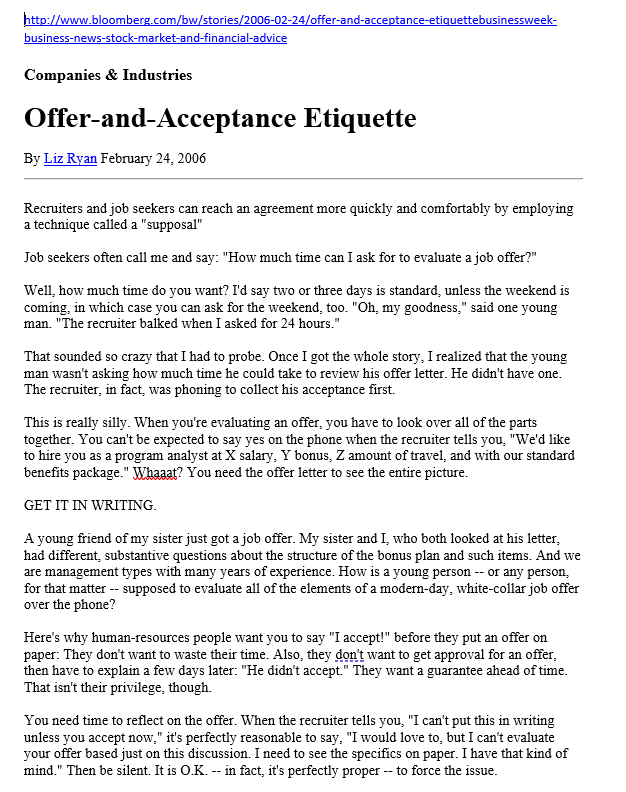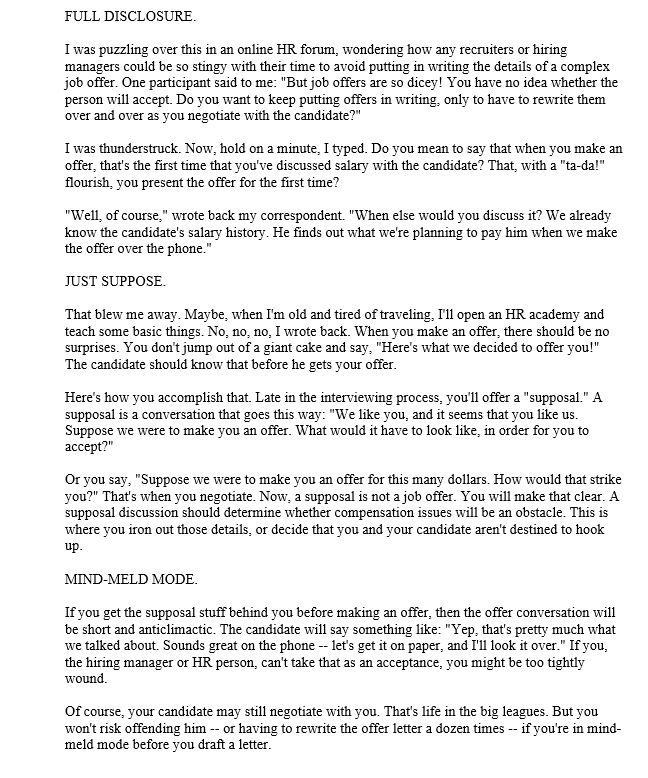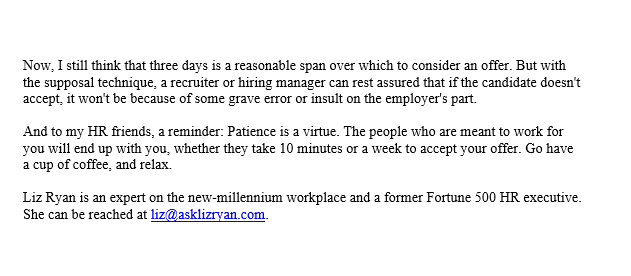http://www.bloomberg.com/bw/stories/2006-02-24/offer-and-acceptance-etiquettebusinessweek- business-news-stock-market-and-financial-advice Companies & Industries Offer-and-Acceptance Etiquette By Liz Ryan February 24, 2006 Recruiters and job seekers can reach an agreement more quickly and comfortably by employing a technique called a "supposal" Job seekers often call me and say: "How much time can I ask for to evaluate a job offer?" Well, how much time do you want? I'd say two or three days is standard, unless the weekend is coming, in which case you can ask for the weekend, too. "Oh, my goodness," said one young man. "The recruiter balked when I asked for 24 hours." That sounded so crazy that I had to probe. Once I got the whole story, I realized that the young man wasn't asking how much time he could take to review his offer letter. He didn't have one. The recruiter, in fact, was phoning to collect his acceptance first. This is really silly. When you're evaluating an offer, you have to look over all of the parts together. You can't be expected to say yes on the phone when the recruiter tells you, "We'd like to hire you as a program analyst at X salary, Y bonus, Z amount of travel, and with our standard benefits package." Whaaat? You need the offer letter to see the entire picture. GET IT IN WRITING. A young friend of my sister just got a job offer. My sister and I, who both looked at his letter, had different, substantive questions about the structure of the bonus plan and such items. And we are management types with many years of experience. How is a young person -- or any person. for that matter -- supposed to evaluate all of the elements of a modern-day, white-collar job offer over the phone? Here's why human-resources people want you to say "I accept!" before they put an offer on paper: They don't want to waste their time. Also, they don't want to get approval for an offer, then have to explain a few days later: "He didn't accept." They want a guarantee ahead of time. That isn't their privilege, though. You need time to reflect on the offer. When the recruiter tells you, "I can't put this in writing unless you accept now," it's perfectly reasonable to say, "I would love to, but I can't evaluate your offer based just on this discussion. I need to see the specifics on paper. I have that kind of mind." Then be silent. It is O.K. -- in fact, it's perfectly proper -- to force the issue.FULL DISCLOSURE. I was puzzling over this in an online HR forum, wondering how any recruiters or hiring managers could be so stingy with their time to avoid putting in writing the details of a complex job offer. One participant said to me: "But job offers are so dicey! You have no idea whether the person will accept. Do you want to keep putting offers in writing, only to have to rewrite them over and over as you negotiate with the candidate?" I was thunderstruck. Now, hold on a minute, I typed. Do you mean to say that when you make an offer, that's the first time that you've discussed salary with the candidate? That, with a "ta-da!" flourish, you present the offer for the first time? "Well, of course," wrote back my correspondent. "When else would you discuss it? We already know the candidate's salary history. He finds out what we're planning to pay him when we make the offer over the phone." JUST SUPPOSE. That blew me away. Maybe, when I'm old and tired of traveling, I'll open an HR academy and teach some basic things. No, no, no, I wrote back. When you make an offer, there should be no surprises. You don't jump out of a giant cake and say, "Here's what we decided to offer you!" The candidate should know that before he gets your offer. Here's how you accomplish that. Late in the interviewing process, you'll offer a "supposal." A supposal is a conversation that goes this way: "We like you, and it seems that you like us. Suppose we were to make you an offer. What would it have to look like, in order for you to accept?" Or you say, "Suppose we were to make you an offer for this many dollars. How would that strike you?" That's when you negotiate. Now, a supposal is not a job offer. You will make that clear. A supposal discussion should determine whether compensation issues will be an obstacle. This is where you iron out those details, or decide that you and your candidate aren't destined to hook up. MIND-MELD MODE. If you get the supposal stuff behind you before making an offer, then the offer conversation will be short and anticlimactic. The candidate will say something like: "Yep, that's pretty much what we talked about. Sounds great on the phone -- let's get it on paper, and I'll look it over." If you, the hiring manager or HR person, can't take that as an acceptance, you might be too tightly wound. Of course, your candidate may still negotiate with you. That's life in the big leagues. But you won't risk offending him -- or having to rewrite the offer letter a dozen times -- if you're in mind- meld mode before you draft a letter.Now, I still think that three days is a reasonable span over which to consider an offer. But with the supposal technique, a recruiter or hiring manager can rest assured that if the candidate doesn't accept, it won't be because of some grave error or insult on the employer's part. And to my HR friends, a reminder: Patience is a virtue. The people who are meant to work for you will end up with you, whether they take 10 minutes or a week to accept your offer. Go have a cup of coffee, and relax. Liz Ryan is an expert on the new-millennium workplace and a former Fortune 500 HR executive. She can be reached at liz@asklizryan.com









